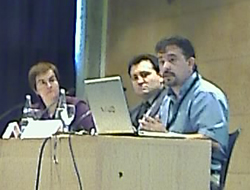The Congress on Internet, Law and Politics has the aim of continuing the task of reflecting on, analyzing and discussing the main changes taking place in law and politics in the information society. This third congress focuses on the questions that currently represent the most important challenges and new developments in the fields of copyright, data protection, Internet security, problems of responsibility, electronic voting, and the new regulation of e-Administration, as well as dedicating a specific area to the current state of the use of new technologies by law professionals.
Do we need e-voting?
Josep Maria Reniu, Professor of Political Sciences, University of Barcelona

Left to right: Rosa Borge, Gerard Cervelló, Josep Maria Reniu
The digital evolution in the public arena is, clearly, slowed down by what happens with voting. And what is happening is, besides lots of pilot projects, few things: electronic voting is still in very early stages.
Nevertheless, the problem is neither lack of (pilot) experiences nor lack of tools and approaches, but a decisive step to implant e-voting. And the question is: do we really need e-voting?
Doubts on:
- Convenience + technooptimism: our actual system is simple [in Spain], thus there is “no need” to do it electronically in order to make it simpler. On the other hand, technological optimism needs reliability of the system, but it really is not that reliable.
- Cutting down costs: DREs are expensive. There still is paper as a voting receipt. And open source software is still not a standard, so customization is still expensive.
- More and better participation: experience have not demonstrated more or less participation. Pilot experiences replication causes weariness (“always experimenting, we want the real thing”). It is true that geographical distribution in participation has been improved.
- Elimination of invalid votes: not a doubt, but a statement. But, there are some voters that do want to express a null vote, hence, we are
- Democratic divide: due to digital divide.
- Security and voting guarantees: not 100% secure. Uncontrolled environments that do not guarantee free voting. Anonymity not guaranteed.
- Individual and collective verification: how to certify that one’s vote is there? And, on the other hand, free access to the source code is required to control the system… and one has to have the knowledge to understand it, so audits become non universal.
- Citizenship acceptation: technophobia, insecurity, lack of interest, tradition/liturgy.
Certainties on:
- Modernization of processes: flexibility of technology
- Cutting down on costs: paper
- increase of participation: some collectives such as expatriates. Appeal for youngest generations
- Several participative applications: languages, colors, etc.
- Need for an electronic ID card
- Need for specific voting authorities: competent to give confidence
- Coexistence of traditional voting and electronic voting: complementary, gradual
Conclusions: electronic voting does not solve anything; digital literacy is a need; a complementary solution; better participation will rely on better information of citizenship.
Secure Electronic Voting
Gerard Cervelló García, Public Administration Manager at SCYTL
What is not electronic voting: electronically managing votes at the backend system. By electronic voting we mean digitally expressing one’s vote.
[Gerard Cervelló gives an overview similar to Josep Maria Reniu’s. I’ll just add here the new topics, opinions, approaches]
Electronic voting offers fastest counting.
A smart option against the highest cost of DREs would be remote voting by means of personal computers, mobile phones or other devices that already exist in the hands (or in public centers such as libraries) of voters.
Requisites of electronic voting:
- usable: easy to understand
- accessible: for everyone
- available: no “sorry, I’m rebooting”
- reusable
- gives confidence: both to the voter and to the Administration
(Not) surprisingly, one of the barriers e-voting has to face is legal framework: most regulations for voting do not allow e-voting, because the way voting is described usually leave out i.e. remote voting, non paper voting, etc.
3rd Internet, Law and Politics Congress (2007)
If you need to cite this article in a formal way (i.e. for bibliographical purposes) I dare suggest:
Peña-López, I. (2007) “3rd IDP Congress on Internet, Law and Politics. Briefings, part VI: Electronic voting” In ICTlogy,
#44, May 2007. Barcelona: ICTlogy.
Retrieved month dd, yyyy from
https://ictlogy.net/review/?p=543
Previous post: 3rd IDP Congress on Internet, Law and Politics. Briefings, part V: The new frontiers of copyright
Next post: 3rd IDP Congress on Internet, Law and Politics. Briefings, part VII: The Law on e-Administration
 RSS feed for comments on this post.
TrackBack URI
RSS feed for comments on this post.
TrackBack URI

